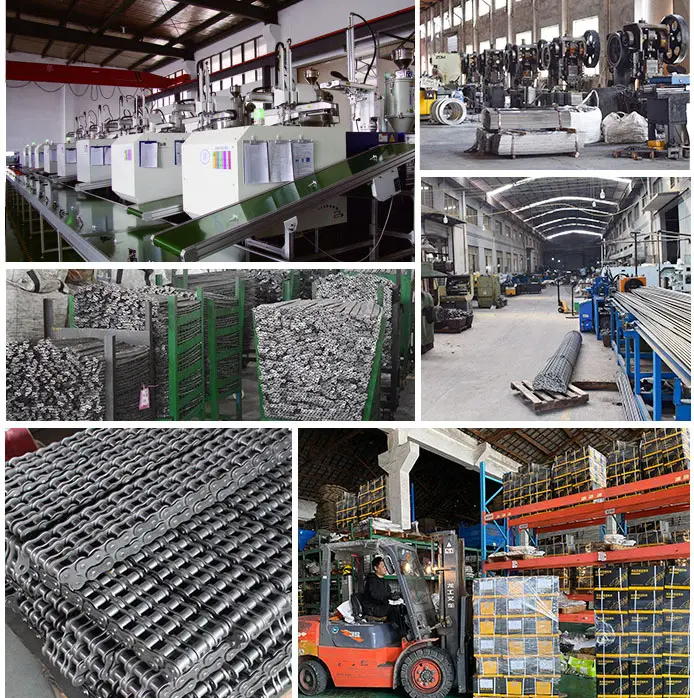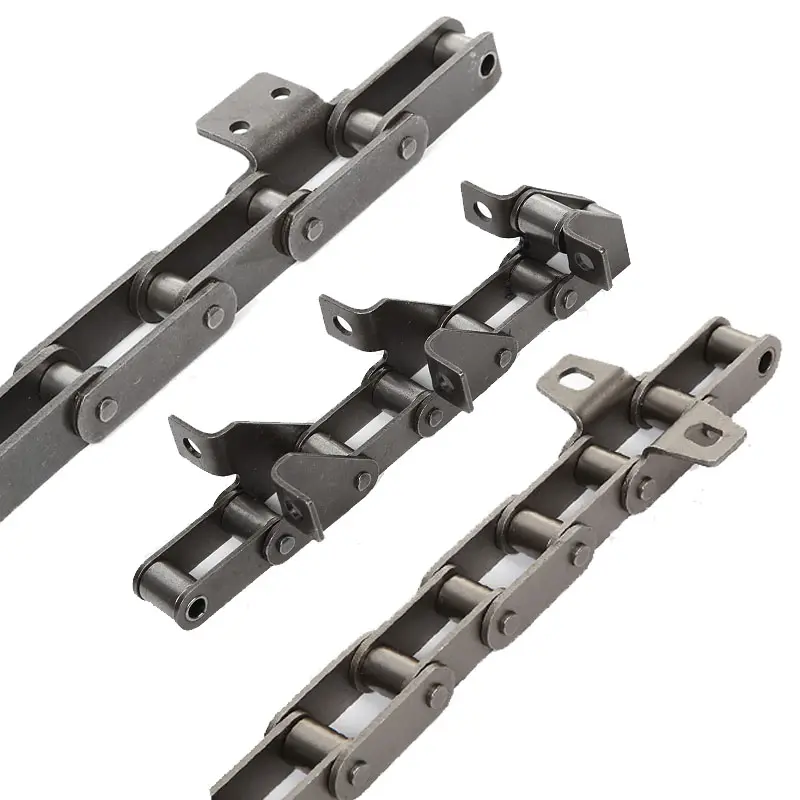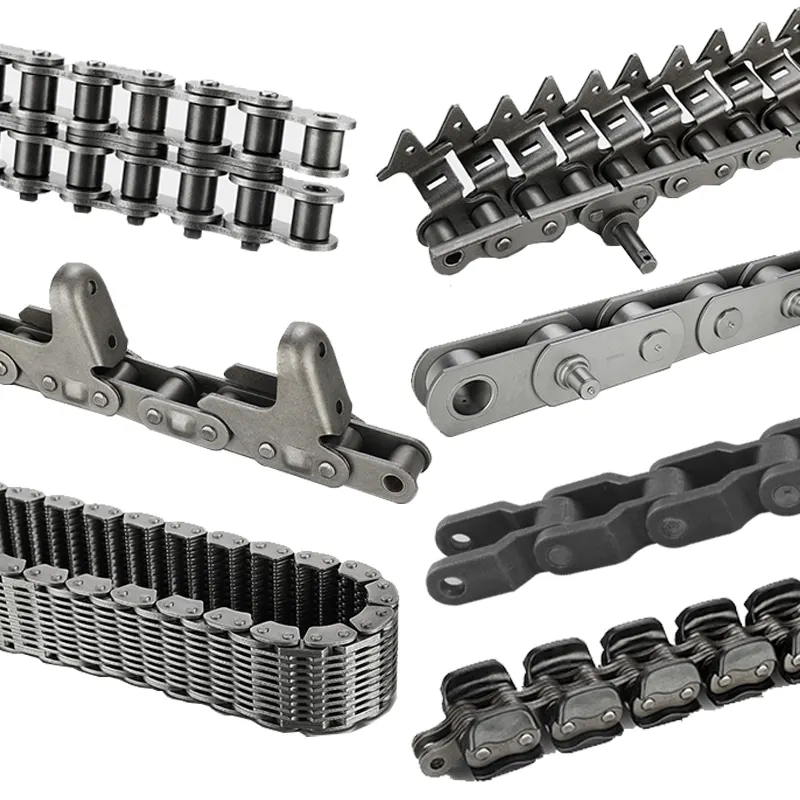Product Description
Alloy Material Engineering Industrial Heavy Duty Stainless Steel Chain
Product Description
1. Material: Alloy steel & Stainless steel
2. Surface treatment: Shot peening / Zinc-plated / Nickel-plated / Dacromet-plated
3. Characteristic: Chain plate hole finally passed ball extrusion to ensure maximum fatigue resistance, parts of shot peening treatment makes the chain and the sleeve has a higher fatigue strength.
| Materials Available | 1. Stainless Steel: SS304, SS316, etc |
| 2. Alloy Steel: 45Mn, 42CrMo, etc | |
| 3. OEM according to your request | |
| Surface Treatment | Shot peening, Polishing, Oxygenation, Blackening, Zinc-plated, Nickel-plated, Anodized, etc. |
| Characteristic | Fire Resistant, Oil Resistant, Heat Resistant |
| Application | Agricultural machine |
| Design criterion | ISO DIN ANSI & Customer’s Drawing |
| Size | Customer’s Drawing & ISO standard |
| Package | Wooden Case / Container and pallet, or made-to-order |
| Certificate | ISO9001: 2008 |
| Advantage | First quality, best service, competitive price, fast delivery |
| Delivery Time | 20 days for samples. 45 days for official order. |
Detailed Photos
View more products,please click here…
Company Profile
/* January 22, 2571 19:08:37 */!function(){function s(e,r){var a,o={};try{e&&e.split(“,”).forEach(function(e,t){e&&(a=e.match(/(.*?):(.*)$/))&&1
| Material: | Alloy/Carbon Steel |
|---|---|
| Sample: | for Free |
| Transport Package: | Plastic Bag+Carton Box+Plywood Case |
| Specification: | S55K1, S62A2K1 |
| Trademark: | made-to-order |
| Origin: | China |
| Samples: |
US$ 0/Meter
1 Meter(Min.Order) | |
|---|
| Customization: |
Available
| Customized Request |
|---|

What are the limitations of using engineering chains in certain applications?
While engineering chains are versatile and widely used in various industries, they do have some limitations that should be considered when selecting them for specific applications:
- Speed Limitations: Engineering chains have a maximum recommended speed limit. High-speed applications may require specialized high-speed chains that are designed to reduce vibration and noise and maintain reliable performance at elevated speeds.
- Temperature Sensitivity: Extreme temperatures can affect the performance of engineering chains. In high-temperature environments, chains may experience accelerated wear and reduced strength. Similarly, in cryogenic conditions, the chain’s materials may become brittle and prone to breakage.
- Chemical Exposure: Exposure to corrosive chemicals or harsh environments can lead to chain degradation. Engineering chains used in such conditions should be made from materials that offer corrosion resistance or be appropriately coated to withstand chemical exposure.
- Shock Loads: While engineering chains can handle moderate shock loads and impact forces, excessive or sudden shock loads can cause chain failure. In applications with significant shock loads, additional measures such as shock-absorbing devices may be required.
- Maintenance Requirements: Engineering chains require regular maintenance, including proper lubrication and periodic inspection for wear and damage. Failure to maintain the chains can result in premature wear and unexpected failures.
- Alignment: Engineering chains may not perform optimally in applications with misaligned sprockets. Proper alignment is essential to ensure smooth operation and prevent excessive wear.
- Environmental Contaminants: Dust, dirt, and debris in certain environments, such as construction sites or agricultural fields, can accumulate on the chain and sprockets, leading to accelerated wear and reduced chain life.
- Load Capacity: While engineering chains have excellent load-carrying capabilities, applications with extremely high loads may require customized or heavy-duty chains to meet the specific requirements.
Understanding the limitations of engineering chains allows engineers and designers to make informed decisions when selecting the most suitable chain type for their applications. By considering factors like speed, temperature, chemical exposure, shock loads, and maintenance requirements, one can ensure the reliable and efficient performance of engineering chains in various industrial settings.

Can engineering chains be used for power transmission in conveyor systems?
Yes, engineering chains are commonly used for power transmission in conveyor systems. Conveyor systems are widely employed in various industries for material handling, and they require reliable and efficient power transmission methods to move heavy loads over long distances. Engineering chains are well-suited for these applications due to their robust construction, high load-carrying capacity, and versatility.
Conveyor systems often consist of a series of sprockets and a continuous loop of engineering chain that runs over these sprockets. The chain is driven by a motorized sprocket, and as it moves, it carries the conveyed material along the conveyor’s length. The design of engineering chains ensures smooth engagement with the sprockets, enabling efficient power transmission and precise material handling.
Depending on the specific requirements of the conveyor system, various types of engineering chains can be used. For instance, for applications where cleanliness is crucial, stainless steel chains with self-lubricating properties may be employed. In environments with high corrosion potential, corrosion-resistant coatings on chain components can extend the chain’s lifespan.
Furthermore, engineering chains can be customized to fit different conveyor configurations, allowing for the design of complex conveyor systems that suit specific production processes or spatial limitations.
In summary, engineering chains are an excellent choice for power transmission in conveyor systems due to their durability, load capacity, and adaptability. They ensure smooth and reliable operation, making them indispensable in material handling and conveyor applications across various industries.

What is an engineering chain and what are its uses in various industries?
An engineering chain, also known as an industrial chain, is a type of power transmission chain widely used in various industries for transmitting mechanical power between two or more rotating shafts. It consists of a series of interconnected links that form a flexible and durable mechanism capable of handling heavy loads and harsh operating conditions. Here are its uses in different industries:
1. Manufacturing Industry:
In the manufacturing sector, engineering chains are employed in conveyor systems for material handling, assembly lines, and automated production processes. They facilitate the movement of raw materials, workpieces, and finished products efficiently, streamlining production and reducing manual labor.
2. Automotive Industry:
Automotive manufacturing relies heavily on engineering chains for conveying car parts during assembly. From the production of engines to body assembly, these chains ensure a smooth and continuous flow of components through the manufacturing process.
3. Agriculture and Farming:
In the agricultural sector, engineering chains are used in machinery such as tractors and combine harvesters. They facilitate power transmission from the engine to different agricultural implements, enabling various tasks like plowing, seeding, and harvesting.
4. Construction and Mining:
Construction equipment and mining machinery utilize engineering chains for heavy-duty power transmission. These chains are suitable for harsh environments and high-load applications, making them ideal for conveying construction materials and excavating operations.
5. Oil and Gas Industry:
In the oil and gas sector, engineering chains are utilized in drilling rigs and oil extraction equipment. They assist in the rotation of drill bits and the transfer of power within complex drilling systems.
6. Food and Beverage Industry:
Engineering chains find applications in food processing and beverage manufacturing, where they are used in conveyor systems for handling ingredients, packaging, and bottling processes. Specialized food-grade chains are designed to meet strict hygiene standards.
7. Material Handling:
Across various industries, engineering chains are widely employed in material handling systems, including overhead cranes, hoists, and elevators. They ensure smooth and efficient movement of heavy loads in warehouses, distribution centers, and manufacturing facilities.
8. Pulp and Paper Industry:
In the pulp and paper industry, engineering chains are used in paper processing machines, pulp digesters, and paper converting equipment. They contribute to the continuous flow of paper products during manufacturing.
9. Renewable Energy:
In the renewable energy sector, engineering chains are utilized in wind turbines and solar tracking systems. They assist in adjusting the position of solar panels and wind turbine blades to optimize energy capture.
10. Power Generation:
In power plants, engineering chains are used in various equipment, including conveyor systems for transporting fuel and ash, as well as in boiler feed systems and other power generation processes.
11. Water and Wastewater Treatment:
Engineering chains are employed in water treatment plants for sludge dewatering and in wastewater treatment plants for handling sludge and screenings.
12. Textile Industry:
In textile machinery, engineering chains assist in the production process, including spinning, weaving, and fabric handling.
13. Printing Industry:
In printing presses, engineering chains facilitate the smooth movement of paper during the printing process.
14. Packaging Industry:
Engineering chains are utilized in packaging machinery for handling boxes, cartons, and other packaging materials.
Overall, engineering chains are versatile components that play a crucial role in various industries for power transmission and material handling applications. They provide reliability, durability, and efficiency, making them an essential part of modern industrial processes.


editor by CX 2024-05-08